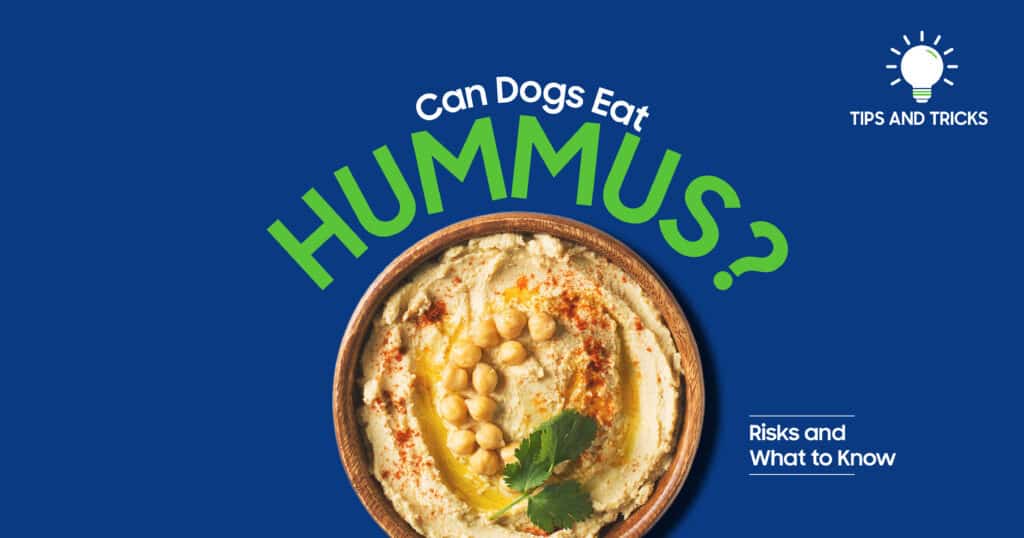Hummus is a very popular party snack. It tastes creamy and delicious, and it’s a healthier version of the “other” dips typically eaten with veggies, pita, or crackers.
But what about our best friends in the animal kingdom? Can a dog eat hummus? Chickpeas, olive oil, and tahini are good for humans, but not all the food you eat is suitable for your dog.
With that being said, let’s discuss the cons of feeding hummus to dogs, what ingredients to avoid, and some safe snacks that are healthier for dogs to consume.
Discover Delicious Food Your Dog Deserves
We dog people love to give our four-legged friends an expensive snack. We are dog owners, and we want to treat our pets nicely. After all, they are more like kids, right? But not all human foods are good or safe for dogs. So many people are happy when they let their pets eat some of their snacks, but this is when many of the absolute worst foods humans eat are bad for dogs.
Hummus is yummy for dogs. However, specific details, such as which types of hummus are acceptable and what should not be eaten, should be well understood.
Can Dogs Eat Red Pepper Hummus?
Now, you may think of red pepper hummus as a treat for your pup. It contains roasted red peppers, tahini (ground-up sesame seeds), and other ingredients. You should not be worried about peppers, but all those other herbs and seasonings might just upset your pet’s stomach.
Spices (chili powder, cayenne pepper) could irritate your dog’s GI system. They may feel discomfort, nausea, or diarrhea. Also, do not forget about dogs and garlic. Garlic is flavorful when added to hummus but is toxic in dogs, and hummus can cause serious issues such as pancreatitis and red blood cell toxicity.
Can Dogs Eat Onion Hummus?
One of the most common toxic foods for dogs is onion. A little onion can be a big problem for your dog’s onion hummus. There should be no room for chance. Onions can lead to oxidative hemolytic anemia, which might require medical treatment. Onions can also irritate your dog’s GI system and cause it to vomit or have diarrhea.
Homemade hummus for dogs could be better if it did not include onions in the list of ingredients. If you purchased a bag of hummus from the store, read the ingredient label. Garlic should also be avoided in hummus because, along with onions, it has similar noxious properties when fed to dogs.
Can Dogs Eat Chocolate Hummus?
Chocolate is well known as a dog’s worst food. It contains a stimulant that can be poisonous to dogs, even in small amounts. Traditional hummus does not contain chocolate, but modern recipes may include chocolate flavor or cocoa powder to make it different. If you are asking if chocolate hummus is okay for dogs, the answer is no!
If your dog has eaten chocolate hummus, call your vet right away, as chocolate ingestion can lead to symptoms like vomiting, diarrhea, seizures, and, of course, death in severe cases.
Can Dogs Eat Carrots and Hummus?
Carrots are an OK snack for the pup. They are low calorie, high fiber, and good for teeth. However, when paired with hummus, it’s a bit messier than that. Carrots are safe and suitable for your dog, but hummus usually comes with some added extras that are not very good for their system.
Olive oil is usually fine for dogs in limited amounts, but too much fat can cause an upset tummy and maybe obesity if fed regularly. Chickpeas are another main ingredient in hummus, and though not poisonous to dogs, they could upset some pets’ digestion. So, you should not feed carrots to your dog if you are serving it with hummus.
Can Dogs Eat Chickpeas?
Hummus is a staple food in most human diets, with chickpeas as one of the mainstays. Yes, dogs allow chickpeas to be eaten. The answer is yes (in moderation). Chickpeas are a fantastic plant protein and fiber source to aid digestion and overall health.
The downside is dog injuries. Too many chickpeas can cause digestive problems in your dog, like bloat, gas, or diarrhea, and should only be given sparingly and in cooked form. Dogs have difficulty digesting raw chickpeas and may choke on them, too.
Is Hummus Bad for Dogs?
So far, we have uncovered some more detailed types of hummus and the elements that they may contain that are toxic to dogs. But is hummus okay for dogs in general? The short answer is that it depends.
Hummus is safe to feed your dog if it is based on ingredients that are okay in small quantities, such as chickpeas, olive oil, and lemon juice. It usually comes packed with spices such as garlic, onions, and every other dog food additive you can think of. While our 100% safe human-related ingredients are poisonous for dogs, make sure that the hummus you choose is free from dangerous stuff.
Are Dogs Allergic to Hummus?
Yes, dogs can be allergic to hummus. Specific ingredients such as the chickpeas in this recipe, sesame seeds (used to make tahini), or olive oil may cause sensitivities/allergies for some dogs. Symptoms of dog food allergies can include:
- Skin rash
- They become skittish
- Swelling or hives
If this is your dog’s first time trying hummus, begin with a small amount and watch for any adverse reaction. Have any allergies appeared? Ask your vet for advice.
Recap. Can Dogs Have Hummus?
Having gone through a rundown of the possible risks and rewards of feeding your dog hummus, to summarize, hummus is not a bad food, but some of its ingredients can be extraordinarily unsafe for dogs.
Dogs should never consume onions or garlic, as they are toxic. While chickpeas (the star of hummus) are generally acceptable in moderation as a treat, they can upset your dog’s stomach if overeaten. A significant amount of olive oil for dogs may even turn into a gastric problem.
Should dogs eat hummus? The answer is no. It’s always better to give your dog healthier doggy treats if you do decide to feed them this kind of food, and it’s best when it comes from a good canine nutrition source. Some great, safe pet foods keep dogs healthy, but not every human food is safe.
With the facts about hummus for dogs now behind us and why it is potentially problematic, we should look at some other healthy doggy treats that are tasty and safe. There are endless options for treating your four-legged friends, whether fresh fruits and veggies or homemade doggy treats.
Your dog only wants the best things in life, so make informed choices so that they can be happy and healthy, too.
FAQs
Can hummus be good for dogs?
Hummus is not recommended for dogs because garlic and onion are toxic to them. But if it’s homemade (without any harmful fillers), then there may even be occasions when a dog could eat it in very small amounts.
What are the signs that my dog is allergic to hummus?
A food allergy symptom could be itching, vomiting, diarrhea, or swellings. If your dog gets sick after you serve the hummus, stop giving it to him and call your vet about these.
Can dogs eat chickpeas safely?
Yes, dogs can eat chickpeas, but only in small portions. Chickpeas are high in protein and fiber. However, too many may cause bloating.
Is olive oil good for dogs?
Olive oil is okay for dogs in small amounts. It has healthy fats, but too much can lead to GI distress and weight gain.
What are some safe alternatives to hummus for dogs?
There are various healthy dog-friendly snacks like carrots, apples, and peanut butter, i.e., plenty of healthy things for your pups. Before introducing a new treat, always read the ingredients and ensure they suit your pet.



